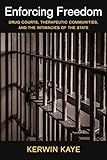Enforcing Freedom : Drug Courts, Therapeutic Communities, and the Intimacies of the State / Kerwin Kaye.
Material type: TextSeries: Studies in TransgressionPublisher: New York, NY : Columbia University Press, [2019]Copyright date: ©2019Description: 1 online resource : 31 figures and imagesContent type:
TextSeries: Studies in TransgressionPublisher: New York, NY : Columbia University Press, [2019]Copyright date: ©2019Description: 1 online resource : 31 figures and imagesContent type: - 9780231172882
- 9780231547093
- 364.6 23
- HV5825 .K37 2020
- HV5825 .K37 2020
- online - DeGruyter
- Issued also in print.
| Item type | Current library | Call number | URL | Status | Notes | Barcode | |
|---|---|---|---|---|---|---|---|
 eBook
eBook
|
Biblioteca "Angelicum" Pont. Univ. S.Tommaso d'Aquino Nuvola online | online - DeGruyter (Browse shelf(Opens below)) | Online access | Not for loan (Accesso limitato) | Accesso per gli utenti autorizzati / Access for authorized users | (dgr)9780231547093 |
Frontmatter -- Contents -- Acknowledgments -- 1. Policing Addiction in a New Era of Therapeutic Jurisprudence -- 2. Drug Court Paternalism and the Management of Threat -- 3. Today Is the First Day of the Rest of Your Life: Rehabilitative Practice within Therapeutic Communities and the History of Synanon -- 4. Control and Agency in Contemporary Therapeutic Communities -- 5. Gender, Sexuality, and the Drugs Lifestyle -- 6. Retrenchment and Reform in the War on Drugs -- Notes -- References -- Index
restricted access online access with authorization star
http://purl.org/coar/access_right/c_16ec
In 1989, the first drug-treatment court was established in Florida, inaugurating an era of state-supervised rehabilitation. Such courts have frequently been seen as a humane alternative to incarceration and the war on drugs. Enforcing Freedom offers an ethnographic account of drug courts and mandatory treatment centers as a system of coercion, demonstrating how the state uses notions of rehabilitation as a means of social regulation.Situating drug courts in a long line of state projects of race and class control, Kerwin Kaye details the ways in which the violence of the state is framed as beneficial for those subjected to it. He explores how courts decide whether to release or incarcerate participants using nominally colorblind criteria that draw on racialized imagery. Rehabilitation is defined as preparation for low-wage labor and the destruction of community ties with "bad influences," a process that turns participants against one another. At the same time, Kaye points toward the complex ways in which participants negotiate state control in relation to other forms of constraint in their lives, sometimes embracing the state's salutary violence as a means of countering their impoverishment. Simultaneously sensitive to ethnographic detail and theoretical implications, Enforcing Freedom offers a critical perspective on the punitive side of criminal-justice reform and points toward alternative paths forward.
Issued also in print.
Mode of access: Internet via World Wide Web.
In English.
Description based on online resource; title from PDF title page (publisher's Web site, viewed 02. Mrz 2022)


